Adam Smith on Empathy, Plus Issues of Divine Revelation

Interview by Richard Marshall

'Smith thinks that we evaluate both the sentiments that lead people into action, and the sentiments by which they react to things, first and foremost by way of their “fit” with what we think they ought to feel, and only secondarily by way of the consequences of what they do. This sets him sharply apart from utilitarianism – he is more distant from it than his friend Hume, for instance.'
'Smithian empathy certainly does not call on us to merge with others. But as we empathize with others, in a projective (Smithian) way, we learn more about our selves as well. Indeed, I think we constantly figure out who we are – and, in part, become who we are – in the course of comparing ourselves to others, for better or for worse.'
'I think the proper role for revelation is to give us a plausible account of our overall goal in life (our “telos,” in the Aristotelian sense), not to provide us with a moral code, or a substitute for science. Revelation provides us with an “ethical” view, rather than a “moral” view, where ethics concerns what makes for a good life as a whole while morality concerns just that aspect of goodness that bears on our respect and care for other people.'
'I certainly do maintain that secularists have an ethical gap (and precisely as regards telic views) that religion can fill. I also think the usual arguments for God’s existence are hopeless, in the modern day, and that we have reason to take any experience as of God, or some other spiritual entity or principle, only once we already have reason to believe in God or other spiritual entities or principles: religious commitments cannot be founded on religious experience, even if religious experiences may play an important role in them.'
'Philosophy conceived as part of a project of self and social transformation can I think not stand alone, however. Philosophy addresses perplexities that we encounter in the course of carrying out our practices, including our transformative practices.'

Sam Fleischacker works in moral and political philosophy, the history of moral and philosophy,and the philosophy of religion. Here he discusses Adam Smith on empathy, it's difference from Paul Bloom's, projection empathy, merging, empirical evidence, Herder and cosmopolitanism, countering bias and misinformation, then why we shouldn't demonise, and then why we might rationaly treat a religious text as divinely revealed, the proper role for revelation, divine texts and difficult ethics, Calvin’s sensus divinitus, how religion fills the telic gap, the role of interpretative work, and finally philosophy as spiritual revival.

3:16: What made you become a philosopher?
Sam Fleischacker: Two things, really, both of which began when I was very young:
First, I went through a period of absolute terror about death, which led me to wonder whether there is a God (and, therefore, perhaps an afterlife), which in turn led me to wonder how we can ever know such things … which in turn led me to wonder what we can know in general. I don't think I yet knew the word "epistemology," but once I learned that word, it captured exactly what I most wanted to understand.
And second, I became interested in political utopias. I think that began when I read a wonderful children's book called The Twenty-One Balloons, which contains a utopia of sorts, but I also had a teacher in eighth grade who gave us the project of coming up with a government for our school, were it for some reason to have to survive on its own for some time. Anyway, I went from The Twenty-One Balloons to Thomas More's Utopia and from there to Plato's Republic (which disappointed me, initially, because I didn't find it a plausible enough utopia). And I found myself really enjoying these books - and thinking about the question of what would make for an ideal government. So when I learned, later on, that there was a thing called “political philosophy,” I thought that I’d also like to do that.
As you may imagine, I spent a lot of time on my own as a kid...

3:16: You’re an Adam Smith expert and have recently written about Smith and empathy. Empathy has come in for a rough ride over the recent few years – Paul Bloom for example has criticized it and thinks it won’t do as a basis for morality. What are the strongest arguments against empathy based morality and was your approach to Smith partly at least driven by you wanting to answer back? Is part of your response that what Bloom et al target is not Smith’s notion of empathy?
SF: Well, yes – I even thought at one point of turning my book into a direct response to Bloom (but For Empathy doesn’t make nearly as good a title as Against Empathy…). I think Bloom (and Jesse Prinz before him) is quite right to say that empathy can render us innumerate – we give priority to the one person with whom we empathize over many others who are suffering at least as much – overly concerned with people like ourselves, and overly aggressive to the people we see as oppressing our victims of choice. All these things are reasons to be concerned about empathy, and to avoid developing an ethical system based on it alone. But I argue that Smith is concerned about precisely these dangers (doesn’t, therefore, base his ethics on empathy alone) and – exactly as you suggest - that his version of empathy is less prone to them than the kinds of empathy Bloom talks about. I don’t think Bloom distinguishes adequately among kinds of empathy.

3:16: Smith’s is a ‘projection empathy’ as opposed to a ‘contagion empathy’ isn’t it? So what’s the difference and what roles do they play in Smith’s approach to an empathy based morality?
SF: Roughly, projective empathy leads us to feel as we think we would feel in someone else’s situation, while contagious empathy leads us to feel as that person actually does feel in his or her situation. So projective empathy opens up a gap between what we feel for others and what they feel for themselves, which in turn allows us to assess their feelings. We may for instance feel that a person is too upset about something (he was rebuked for a thoughtless remark but we think he deserved that rebuke) or not upset enough (she is, we think, too inured to the humiliations she puts up with). Smith thinks that we evaluate both the sentiments that lead people into action, and the sentiments by which they react to things, first and foremost by way of their “fit” with what we think they ought to feel, and only secondarily by way of the consequences of what they do. This sets him sharply apart from utilitarianism – he is more distant from it than his friend Hume, for instance.
3:16: How far does empathy ask us to go – am I to try and actually be you, or just imagine your situation and what it must be like to be there? If I actually imagine being you it seems that I must lose my ability to understand and evaluate doesn’t it because I can’t stand outside of the whole situation doesn’t it? Even blurring the boundaries between myself and the other raises this problem doesn’t it? What does Smith think, and is he right?
SF: I’m strongly opposed to the idea that we merge with others in empathy (as is Tom Kohut, in his recent, excellent Empathy and the Historical Understanding of the Human Past – a book that came out just after mine): that does entail, as you say, losing our ability to understand and evaluate others. And Smithian empathy certainly does not call on us to merge with others. But as we empathize with others, in a projective (Smithian) way, we learn more about our selves as well. Indeed, I think we constantly figure out who we are – and, in part, become who we are – in the course of comparing ourselves to others, for better or for worse. By imagining myself into your situation, and comparing that with how you seem to feel in that situation, I help determine whether I am like you or unlike you – and whether I want to become more like you or more unlike you. (This is the point of the title of my book: Being Me Being You .) I think this is also Smith’s view, but The Theory of Moral Sentiments is ambiguous on this point, and I am here to some extent reading into Smith the view I think he should hold as much as trying to figure out what he does hold.
3:16: If we’re to be empathic in this way, is there empirical evidence that we can and do achieve this?
SF: There is the same kind of empirical evidence on this as there is on most ethical issues: introspective evidence, and evidence from what people in common life say about one another. It can also be argued that empathy along these lines – thinking ourselves into each other’s situation – is an essential condition for language-learning, or at least for the capacity to carry out a conversation.
Of course the evidence I’m appealing to here is very loose and can be read in very different ways. I think the attempt to find “harder,” more “objective” evidence than this for fundamental features of our social and psychological nature is a bit of a fool’s errand, however. The data that empirical psychologists and sociologists come up with, from their questionnaires and clever experiments, are usually just as ambiguous, just as susceptible of multiple explanations, as the introspection, bits of common life conversation, and loose appeal to conditions for language-learning that I rely on.

3:16: How does Herder support Smith’s approach, and how does he deal with the difficulty of attaining complete cosmopolitanism? Isn’t empathy always pushing us back to favour people like ourselves and so dwells in the local rather than anything universal?
SF: I don’t think anyone attains complete cosmopolitanism – even the ancient Stoics were far more shaped by and committed to specifically Greco-Roman norms and attitudes and habits than they realized. Cosmopolitanism is a noble aspiration in many ways, but people who think they’ve achieved it are fooling themselves: arrogantly and dangerously, in many cases, since they tend to want to impose what they take to be universal norms and attitudes, but are in fact local ones, on everyone else. That’s Herder’s central point, I take it, and he provides a great corrective to this sort of arrogance. Which doesn’t mean we should simply accept our local limitations and bury ourselves in communities of people like ourselves. We can instead work out from within our local perspectives and try as best we can to enter into the local perspectives of other people: widening the reach of our empathy, and empathetic care, as we do this, and perhaps widening the reach of our community’s empathetic care as well. Instead of dwelling just in the local, with all its narrowness and xenophobia, or trying to dwell in the universal, which is impossible, we can “dwell” in the local while “traveling” - in imagination or in reality – into other local worlds as well. That’s the model I think we get from Herder, and it adds a nice awareness of cultural placement and cultural limitations to Smith, while avoiding the illusions of cosmopolitanism.
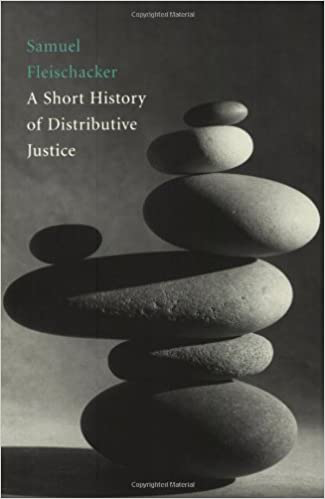
3:16: You don’t think that empathy alone makes a good basis for morality and politics do you, but you don’t like utilitarianism either do you? Can you sketch what else is needed so that a Smithian empathy can be used well?
SF: Sure. First of all, we need to correct our empathy for bias and misinformation – we need constantly to be alert to the danger that we have fallen prey to these things and try instead to have the empathy of what Smith calls an “impartial spectator”: that entails empathy for both sides in a conflict, especially. Second, we need to recognize that general rules of procedure, impartially upheld, are necessary to maintain justice and freedom over time in any society – that’s the only way for people to be able to plan things on their own - and that many moral and political decisions will have to be based on these rules rather than on what empathy alone, no matter how unbiased and well-informed, would lead us to do. And third, in some cases, we do need simply to try to save the largest number of lives that we can, or to promote happiness for the largest number of people: utilitarianism, or perhaps a utilitarianism constrained by some version of Rawls’s maximin principle, does make sense for decisions about the distribution of basic goods, especially those needed for survival, in a large society.
3:16: Why do you argue that we shouldn’t demonise anyone? Isn’t this asking too much of us and shows that the moral system is flawed on the grounds that any morality that requires us to be saints is flawed? It’s the big complaint against Singer’s utilitarianism, for instance.
SF: Not demonizing anyone – not regarding anyone as driven purely by evil – is perfectly possible without being a saint. By condemning demonization, I’m not condemning all harm to other people, whether for self-defense or punishment. We may sometimes, in war for instance, even have to kill our enemies, but many soldiers manage that without demonizing their enemies. On the other hand, in war and elsewhere, torture and unnecessary killings are often a product of demonization; that’s one of its grave dangers. To reject demonization is to attempt to understand what every other human being does as something you might have done yourself – to understand their motivations as ones that you might have had, ones with which you can empathize. (Anti-demonization is a version of the humanist principle that “nothing human is alien to me”). That should help us a) prevent others from becoming like the evil-doers we’re concerned about, b) help those evil-doers change their ways, c) punish them only to the extent that they deserve it, and d) prevent ourselves from becoming like them. I can’t see any exception to the rule that anti-demonization in this sense is a good thing, and I don’t think it demands of us anything nearly as difficult as Singer’s utilitarianism does.

3:16: Not only are you a top Smith scholar but you’re also an expert in aspects of philosophy of religion. An intriguing argument you’ve made is regarding how we might rationally take a religious text as divine revelation, something familiar in the monotheistic religions as well as elsewhere. So can we look at this. What is the role of the secular for someone wanting to believe in the divine revelation of a text ? Is it because anything secular can’t give an ultimate grounding for values that it becomes reasonable to take the religious text as divine revelation?
SF: Yes, that’s right – I think the proper role for revelation is to give us a plausible account of our overall goal in life (our “telos,” in the Aristotelian sense), not to provide us with a moral code, or a substitute for science. Revelation provides us with an “ethical” view, rather than a “moral” view, where ethics concerns what makes for a good life as a whole while morality concerns just that aspect of goodness that bears on our respect and care for other people. And morality, in this sense, can and I think should be largely grounded in secular considerations – religious teachings should be integrated with our secular reasons for respecting and caring for our fellow human beings, and are dangerous when they are taken to override such considerations. The empirical study of the world – science - also, as I hope need hardly be said, is and should be pursued in wholly secular ways, without having at any point to kowtow to religious teachings (which is not to say that science is in its proper sphere when it purports to tell us about non -empirical things, like the existence or nature of God). But in my opinion and in the opinion of other religious believers, neither secular morality nor secular philosophy can give us adequate reason to see our lives as worthwhile. Revelation – precisely because it transcends or sets aside reason, to some extent – can I think offer us something here that no secular reasoning possibly could. And when it does, it leads us to revise our ethical views without necessarily changing our morality.
I don’t expect this short summary will convince anyone. The argument for each point I’ve just made is complex – it took me several hundred pages to make my case, in Divine Teaching and the Way of the World – and in any case, I don’t think reason alone can lead one to faith in a revelation. A telic vision — a vision of how we ought to live our lives overall — needs to be compelling affectively as well as rationally, and we find compelling such visions in a revelatory text or teaching when we are moved by it, not just when it seems reasonable to us. We need what I call a “reflective love” for the revelation we accept, and philosophical argument alone cannot get us there. This should not be surprising. If revelation transcends reason, we shouldn’t expect reason alone to convince us of it.
There’s a debt to Kierkegaard in my view of religion, as may be obvious, even though my religious commitments are Jewish rather than Christian. (I’ve drafted a piece called “Kierkegaardian Judaism,” and the working title of my current project – playing off of the title of a famous book by Hermann Cohen – is Religion of Paradox Out of the Sources of Judaism.) I think Kierkegaard has been badly misread as anti -rationalist, however. The place of reason in his work is complex, and indeed one can appreciate the power of what he calls “the paradox” only if one begins by sharing his deep respect for reason. C. Stephen Evans has brought this out marvelously in his work on Kierkegaard.

3:16: So why is it reasonable to believe a text to be divine revelation especially when we confront notorious texts in them? Surely the Torah, the Bible and the Koran all include examples of passages that are difficult to accept – although you think the Christian New Testament is flawed because it doesn’t have any – so why are examples of what we’d consider woeful ethical values an advantage to anyone wanting to reasonably accept as text as coming from a source without those woeful flaws? How does Maimonides help you here?
SF: I don’t think we should accept texts as divinely revealed because of their morally problematic passages, of course, but if we do come to think we have reason to see a text on the whole as coming from God – if we come to see it as revealing a deeply beautiful and inspiring as well as morally good telos for our lives - we can take what I call the moral “pockmarks” in it to be opportunities to exercise our skills at interpretation: to find deeper meanings in the text and thereby to expand our ability to find deeper meanings in texts, and human actions, more generally. This can itself be a valuable function of a revealed religion.
Maimonides radically and ingeniously re-interpreted much of the Torah – not just the morally disturbing bits, but everything that didn’t fit with his rigorously abstract, Aristotelian and neo-Platonic theology – and thereby set up a model for how modern Jews can re-interpret it. But his methods of interpretation come out of a long tradition of creative hermeneutics, in rabbinic Judaism, that had already done a lot of work to tone down or eliminate the more disturbing bits of the written Torah. I regard those bits as the grain of sand in the oyster of Judaism (apologies for the unkosher example) which gave rise to the pearl of the rabbinic tradition.
I should add that I do NOT regard the New Testament as morally flawless! It endorses slavery and a sexist family structure; Jesus is also an angry character in it, much of the time, who rails against (other) Jews in ways that helped launch the ugly history of anti-Semitism - see the opening of John 8, especially. It’s just that nothing Jesus says jumps out at the reader as utterly unacceptable, morally, to the degree that, say, the command to stone stubborn and rebellious sons in Deuteronomy does. But that verse in Deuteronomy is a perfect example of the sort of “pockmark,” or grain of sand, that inspired some quite wonderful hermeneutical pyrotechnics in the Talmud.
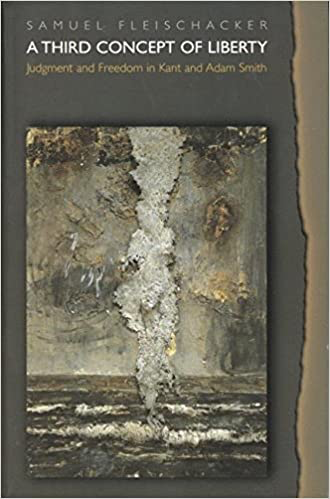
3:16: Why do you think it is reasonable to accept the divine revelation of a text but not to accept that a religious person might consider an epistemology at odds with secularism, such as Calvin’s sensus divinitus?
SF: Accepting a text as divine revelation, on my view, is part of an ethical faith: something we do, in Kantian vein, as part of how we make sense of our pursuit of the good. I am not proposing that divine revelation is or should be accepted on the basis of a form of knowledge : that we should endorse it from a “theoretical” or “speculative” standpoint, to stick with Kant’s terms. But that is precisely how Calvin’s “sensus divinitatus” functions, especially as Plantinga uses it. The idea that religious people have some sort of extra cognitive “organ” by which to know that God is among the entities in the universe, and/or what God wants of us, strikes me as absurd and potentially dangerous: it can license all sorts of immoral claims, like the insistence that everyone should be made to share one’s own religion (something Calvinists have indeed done, for centuries). Maintaining an ethical faith in God is quite different. That does not interfere with our view of cognition, and does not allow for immoral religious commitments.
3:16: Why do you propose foregrounding the arguments defending telic belief over the usual arguments about proofs for God’s existence or the reality of religious experiences etc? Is it because you sense that there is a genuine failure of secularist telic beliefs that make the religious belief more reasonable than when religious thinkers go up against secular science, for example? In this sense, is your argument a religion of the gap type of argument – secularists have a gap and religion can fill it?
SF: Yes, I suppose it is a sort of “gap” argument – I certainly do maintain that secularists have an ethical gap (and precisely as regards telic views) that religion can fill. I also think the usual arguments for God’s existence are hopeless, in the modern day, and that we have reason to take any experience as of God, or some other spiritual entity or principle, only once we already have reason to believe in God or other spiritual entities or principles: religious commitments cannot be founded on religious experience, even if religious experiences may play an important role in them. (I don’t think these claims are at odds with anything Alston says in Perceiving God ). In addition, I see moral dangers in approaches to religion that start with arguments for God’s existence and move only from there to the goodness of following a path that is said to be God’s will for us. (Again, this is very much Kierkegaard’s view, as I understand it, in both the Philosophical Fragments and the Concluding Unscientific Postscript .). See also my answer to why it might be reasonable to accept a divine text earlier also.
3:16: What do you say to the push-back that religions tend to view each other with a great deal of scorn – they themselves don’t think they are all divinely revealed? Ecumenicals tend to have to drop elements of the divinely revealed text in order to claim some convergence – surely this goes against the idea that all religious texts – and religions themselves – are revelatory of a divine. It looks like only one could be justified, if any, or just those that didn’t denounce each other?
SF: If what makes for a compelling revelation is that it moves us, then we should not find it surprising if different people put their faith in different revelations: even equally reasonable people may be moved by different things. And in fact people tend to be moved primarily by stories and teachings on which they were raised as a children, or that connect in some way to what they loved as a child. I think the “reflective love” that attaches us to a revelation is generally built on the love we have for our families and cultures (a special story needs to be told for conversion, of course); from a religious point of view, that is to say that God brings us to the love of God by way of familial love. It makes sense to me that God would work that way, and that God would, therefore, speak to different families and cultures in different ways. It doesn’t make sense to me that God – the all-good Being who created and cares for all of us – would give a single correct revelation to one group of people and allow everyone else, through no fault of their own, to believe in falsehoods. That view has moreover historically been the source of a great deal of violence and brutality: I have no problem saying that all religions should work to free themselves from it. On my view, it takes interpretive work, on the part of those who accept a revelation, to bring out what is ethically inspiring in it — no revelatory text or teaching is wholly straightforward (there are also ethical advantages to our having to work to understand it) — and one piece of that work, in each religion, should be to read it in such a way that we can recognize other groups of people as also having received revelation.
3:16: Your approach to philosophy seems to be refreshingly about spiritual self transformation and catalyzing a flourishing life for radical service to the world done with a traditional Jewish orthodox inflection. Can you say something about how important you think it is to understand what spiritual transformation is like from the inside of a tradition, so to speak, and whether you think your approach links with those philosophers such as Hadot, Gadamer, Nussbaum and Rorty who see philosophy as having at its heart a spirit of self transformation and social transformation, something which might be hard to see in the contemporary professionalization of the discipline?
SF: I’ve tried to say something about how traditional Jewish practice can effect spiritual transformation in a piece on the Jewish sabbath for David McPherson’s collection, Spirituality and the Good Life (Cambridge: Cambridge University Press, 2017). If you don’t mind, I’d rather direct interested readers to that piece than try to say something about how I bring philosophy together with my personal Jewish commitments here: I feel uneasy about giving any brief sketch of that subject. But in that article, I do talk about Hadot, who I think has done wonderful work in stressing the fact that philosophy at one time – indeed, precisely when it was most highly regarded — was integrated with a full discipline for guiding one’s life, rather than being a merely academic exercise. I do wish it was more often done in that spirit today. We’ve gained some clarity and rigor from the professionalization of philosophy, but we’ve also lost a lot of its function.
Philosophy conceived as part of a project of self and social transformation can I think not stand alone, however. Philosophy addresses perplexities that we encounter in the course of carrying out our practices, including our transformative practices. We discover that a basic term we use in a practice is unclear or confused, that beliefs basic to the practice don’t hold together well, or that we’re not sure of our goals, or of how to revise our goals in new circumstances. Philosophy helps us clarify our terms, untangle our beliefs, and re-examine our goals and find ways of adapting them. To do this, we need to stop what we’re doing for a bit, hold back and reflect. For that reason, philosophy always stands to some extent outside our practices, is never quite of a piece with them. But it should I think always be directed towards practice: it can help us achieve ends like self or social transformation only in conjunction with a cultural or religious tradition, or a political movement. I have great respect for philosophers who see their work in political philosophy as helping to clarify the ends or proper methods of liberal or socialist or feminist or race-critical political projects (my own work on my Adam Smith, and distributive justice, has been intended to inform and shift the self-conception of liberalism). My work in the philosophy of religion is similarly aimed at helping fellow believers in text-based (“revealed”) religious traditions figure out how they can reconcile their views with modern science and a modern (liberal) moral outlook. It thus contributes indirectly to self and social transformation. The main work I try to do in that direction draws however on Jewish practice and my relationship with my various Jewish communities (I belong to an Orthodox synagogue but am also involved in various ways with a Reform synagogue near me and several groups working with progressive causes in Israel, or for a just and peaceful solution to the Israeli-Palestinian conflict).
3:16: .And for the readers here at 3:16, could you recommend 5 books other than your own that will take us further into your philosophical world?
SF: 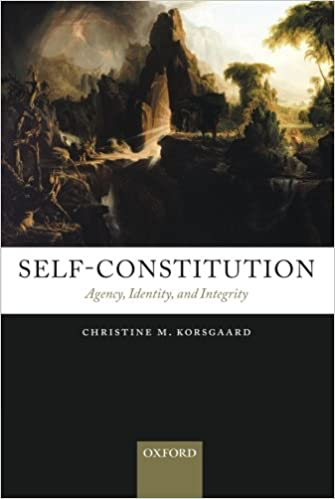
Christine Korsgaard, Self-Constitution (there are at least two other Korsgaard books that I would recommend as well – but I don’t want to pack the list with her stuff alone) - Brings Kant and Plato together wonderfully, in modern terms: so exciting that I had it by my bedside in place of a novel, for some weeks.
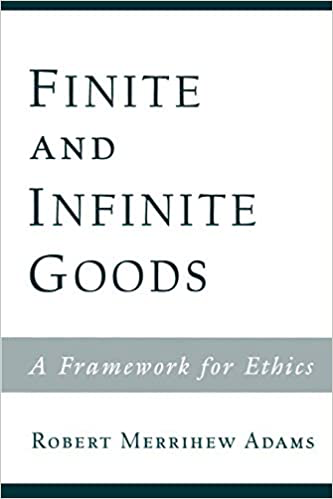
Robert Adams, Finite and Infinite Goods – Quite simply, the best book of the past 50 years in the philosophy of religion, in my opinion.
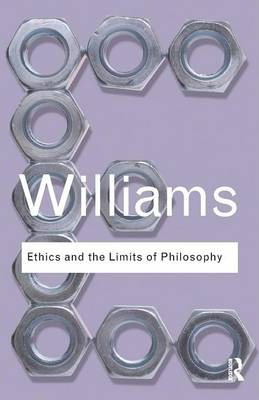
Bernard Williams, Ethics and the Limits of Philosophy - Williams is here, as everywhere, irritating and dismissive as well as wonderfully insightful, but the book is filled with incisive critiques of utilitarianism, Kantianism, and modern Aristotelianism, and makes promising moves towards a way of getting beyond these programs, in modern secular ethics.
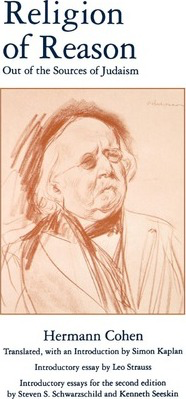
Hermann Cohen, Religion of Reason Out of the Source of Judaism - A relatively overlooked masterpiece in Jewish philosophy, from just over a century ago, which among other things anticipates liberation theology (we stand with God when we stand with the poor, for Cohen). I resist Cohen’s relentless rationalism, but this is a rich integration of Kantian and Hegelian lines of argument with Jewish texts, and in that regard it is an important model for my own work.
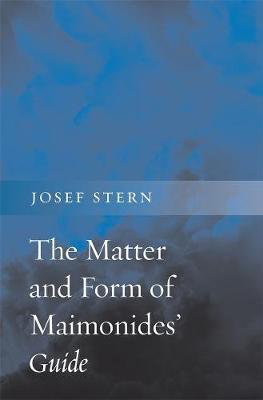
Josef Stern, The Matter and Form of Maimonides’ Guide The richest and most creative book ever written on Maimonides (not an easy read, though: worth savoring over a bit of time)

ABOUT THE INTERVIEWER
Richard Marshall is biding his time.
Buy his second book here or his first book here to keep him biding!
End Time series: the themes
Huw Price's Flickering Shadows series.
Steven DeLay's Finding meaning series
NEW: Joseph Mitterer's The Beyond of Philosophy serialised